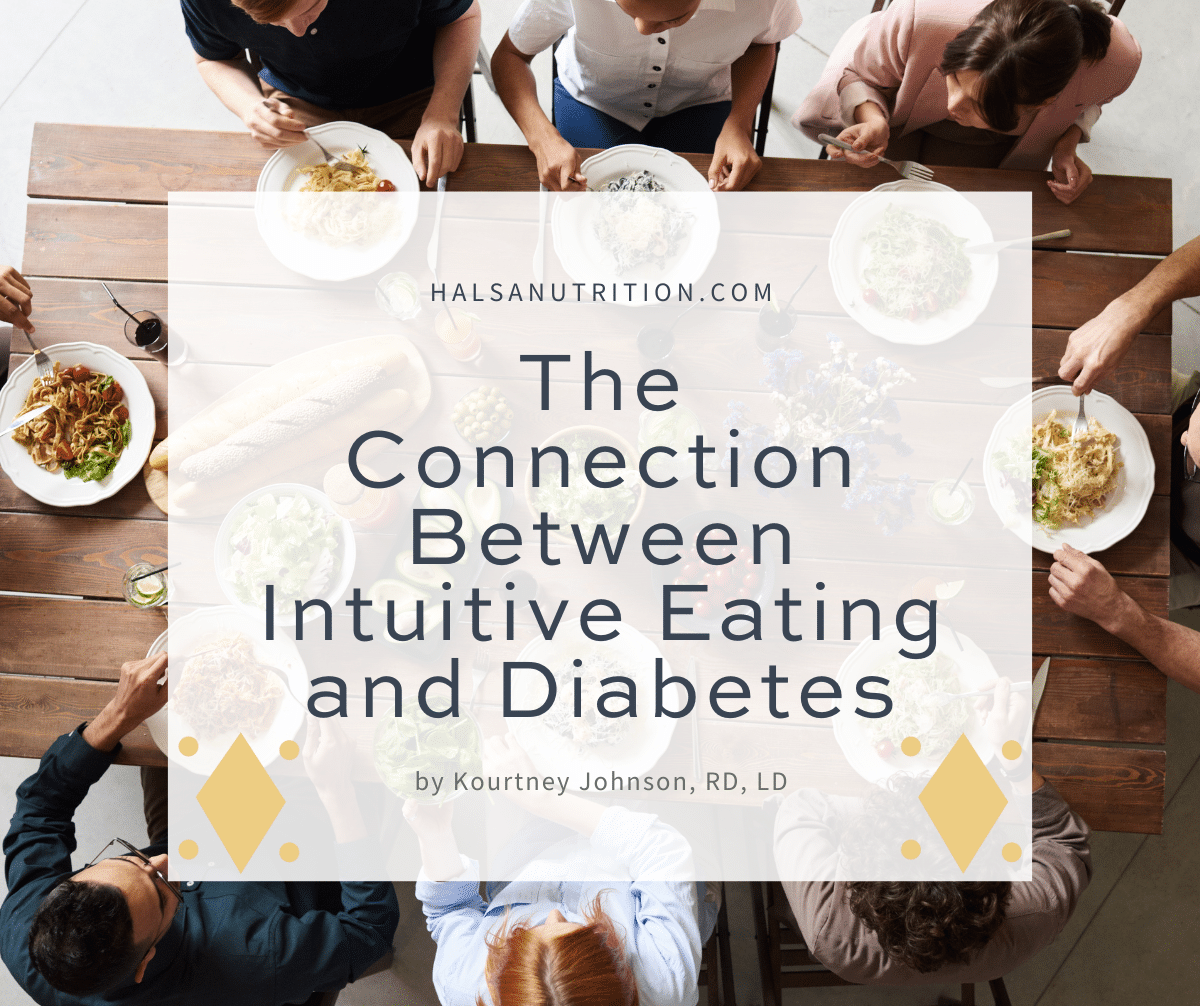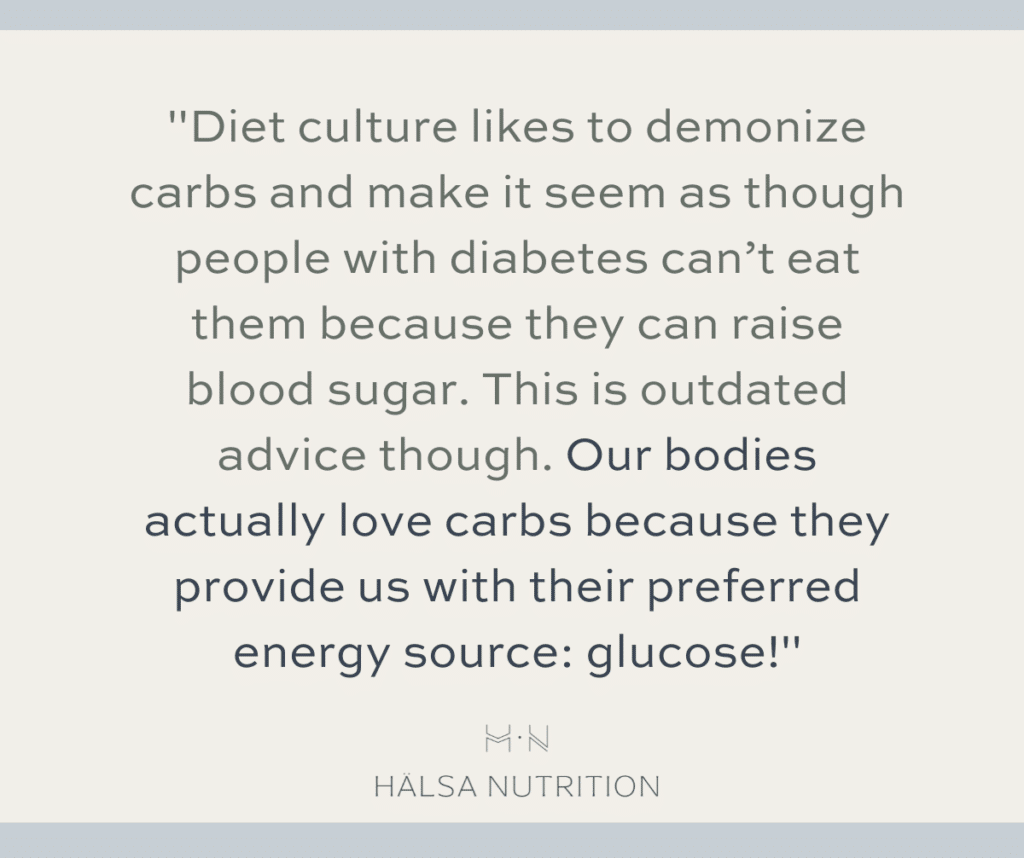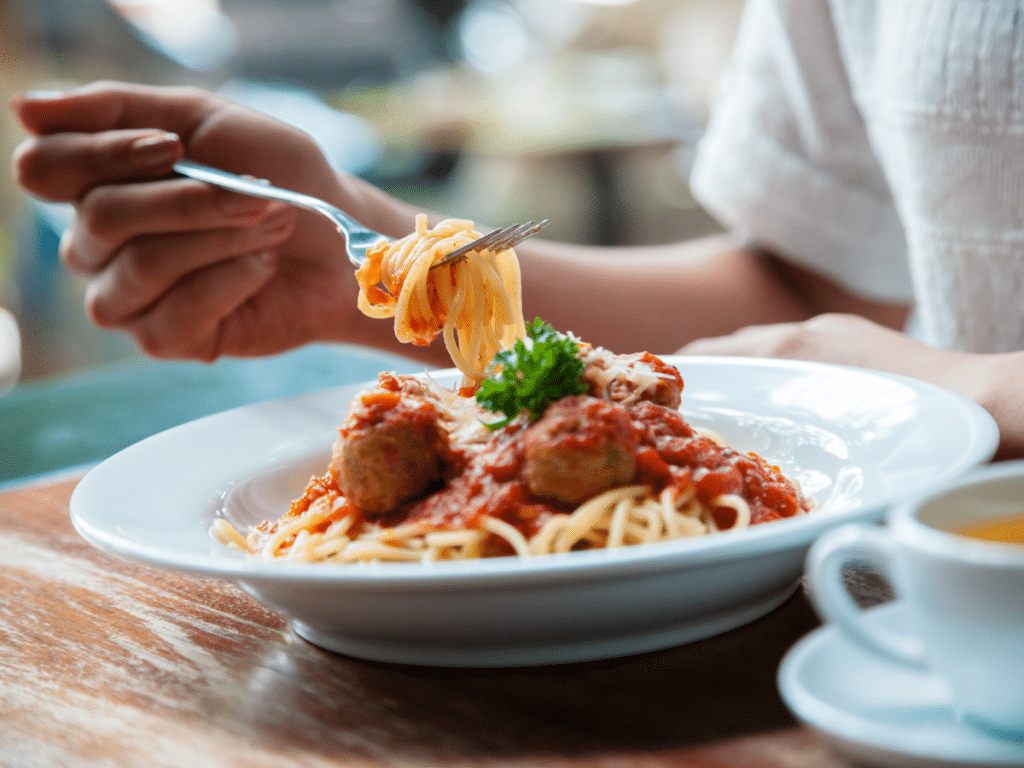
The Connection Between Intuitive Eating and Diabetes
by Kourtney Johnson, RD, LD
Estimated reading time: 5 minutes
One of the most commonly asked questions about Intuitive Eating is if people with health conditions such as diabetes can do it. This likely comes from the idea that Intuitive Eating is eating whatever you want, whenever you want, which isn’t true.
Evelyn Tribole and Elyse Resch define Intuitive Eating as “a self-care eating framework, which integrates instinct, emotion, and rational thought…based on a weight-inclusive, evidence-based model with a validated assessment scale and nearly 200 studies to date.”
Interestingly, if dieting didn’t exist, Intuitive Eating would just be eating! So yes, Intuitive Eating and diabetes definitely go together!
A Review of Nutrition and Diabetes
Carbs are nutrients found in many foods, including:
- dairy products,
- fruit,
- bread,
- pasta,
- lentils,
- beans,
- sweets,
- drinks with added sugar,
- and the four starchy veggies: potatoes, peas, corn, and winter squash.
Non-starchy vegetables, such as carrots and bell peppers, have a smaller amount of carbs.
Diet culture likes to demonize carbs and make it seem as though people with diabetes can’t eat them because they can raise blood sugar. This is outdated advice though. Our bodies actually love carbs because they provide us with their preferred energy source: glucose! While everyone eats a little differently, and what you prefer likely looks different from your friend’s preferences, it is absolutely possible to eat all foods with diabetes and implement Intuitive Eating along the way.

While carbs are an important nutrient to include in your eating pattern, there are certain steps people with diabetes can take to prevent blood sugar spikes. Here are a few ways to help keep blood sugars steady when enjoying carbs:
- Pair carbs with protein (including meat, cottage cheese, eggs, or tempeh)
- Include fat (such as nut butter, olives, or nuts)
- Choose carbs high in fiber (e.g., whole grain bread, whole wheat pasta, quinoa, barley, oats, legumes, the skin of the potato, and energy bars with added fiber)
Fat, protein, and fiber all help slow digestion and help prevent blood sugars from spiking.
Participating in joyful movement, which is one of the principles of Intuitive Eating, is another way to manage diabetes. Joyful movement is all about finding what you enjoy and what feels good to you. It might take time to figure out exactly what that is! One suggestion is to think about how you would choose to move your body if the purpose wasn’t to change its size or shape.
Intuitive Eating and Diabetes Go Together
Taking the idea of rational thinking into account, Intuitive Eating doesn’t promote eating whatever, whenever. For example, choosing to pair carbs with fat or protein is using rational thinking to eat in a way that is being kind to your body. If you think about a typical day for you, there are likely times when you are full or just don’t want to eat. The same thing happens when eating intuitively!

Plus, if your blood sugar is high, for example, you might not feel good, or you might simply decide not to eat carbs for the time being in order to allow your body to bring your blood sugar down. Again, rational thinking plays a significant role when managing Intuitive Eating and diabetes!
Instead of Feeling “Bad” or “Good”, Get Curious
Diet culture promotes judgment around what we eat, making us think we are “bad” for eating certain foods and “good” for eating others. It’s also very easy to blame ourselves for having high or low blood sugars because it must have been something we did “wrong.” Remember that diabetes is complex, and you can do the same exact thing two days in a row and still have wildly different blood sugars. Plus, other factors besides food play a role in diabetes management, such as stress, sleep, physical activity, hormones, and temperature. Ultimately, judging yourself for your blood sugars won’t help, which is why it’s best to look at different situations as information and opportunities to practice curiosity.
How a Registered Dietitian Can Help
Working with a non-diet registered dietitian, such as Maria, can allow you to recognize the ways diet culture is affecting you and your diabetes management. Being aware of this influence makes it easier to work through the Intuitive Eating process as it’s intended to be: a framework that allows you to meet your body’s unique needs without negative external factors, like diet culture, creeping in.
Maria is also able to answer your questions about Intuitive Eating and diabetes, calm your fears, and be a supportive influence in your journey. If you are curious about what it would look like to work together, click here to schedule a free call!
Other Articles You Might Like
- How Intuitive Eating Affects Health Markers
- The 10 Principles of Intuitive Eating Help You to be Kind to Your Body
- Meal Prep and Intuitive Eating
- What Started the Intuitive Eating Movement?
- Health Benefits of Intuitive Eating
About the Author
Kourtney is a registered dietitian who is passionate about sharing information related to intuitive eating and the harms of diet culture. She is from Minnesota but now lives in Spain, where she enjoys trying new foods and learning more about the culture there! In her free time, she likes to read, go to the beach, spend time with friends and family, and travel.
This article was edited and reviewed by Maria Adams, MS, MPH, RDN, LDN, a registered dietitian and Certified Intuitive Eating Counselor. Maria takes a weight-inclusive approach and helps individuals rediscover the joy of food by helping them heal from chronic dieting and disordered eating. She holds a Bachelor of Science Degree in Nutrition Science, a Master of Science in Nutrition Communication, and a Master of Public Health.
Leave a Reply